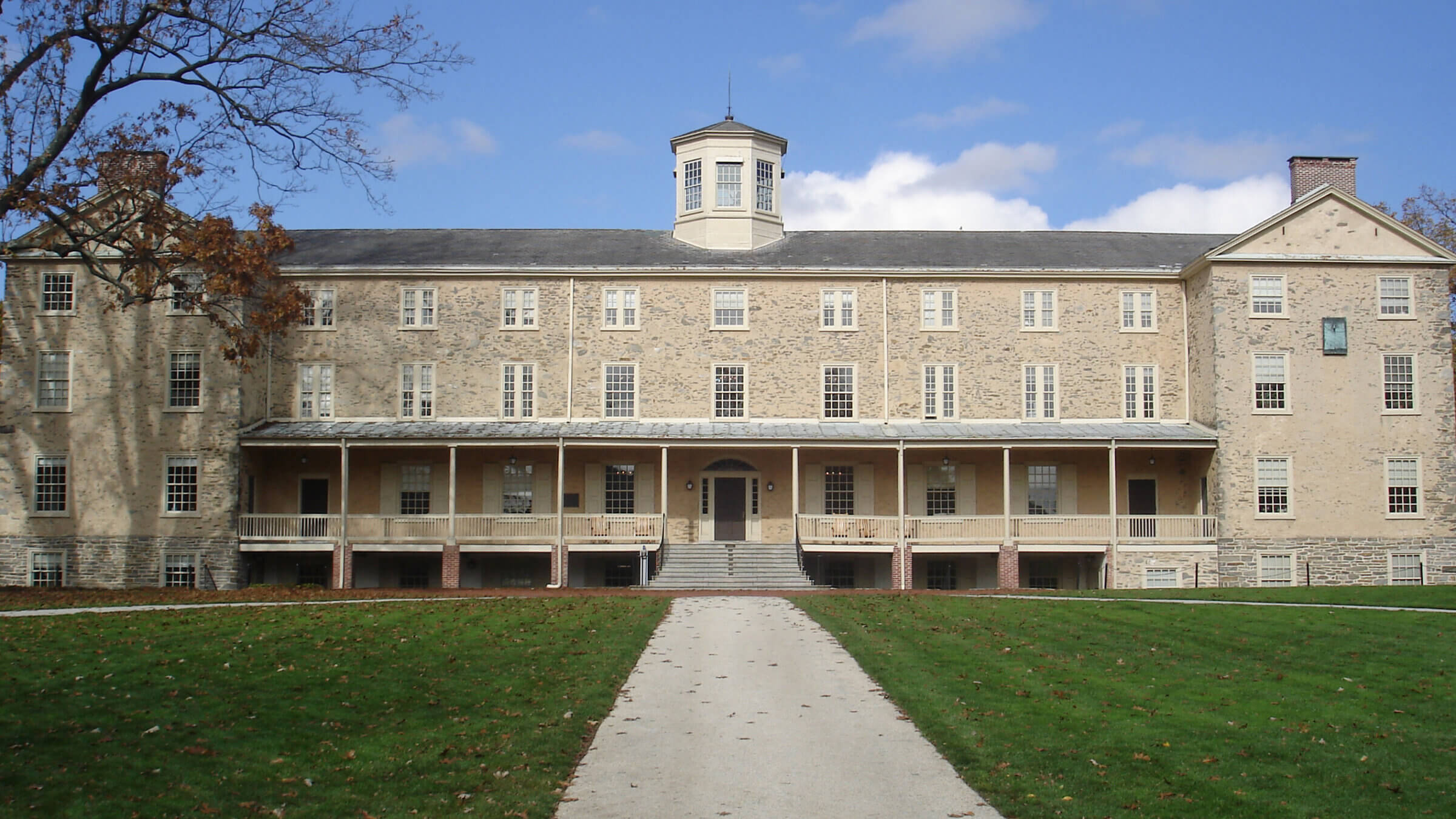Philly Federation furious over Haverford’s ‘COVID in times of genocide’ campus event
And that was the workshopped name

Haverford College’s Founders Hall, completed in 1833. Photo by Jackbauerinvc/Wikimedia Commons
An event for Israel Apartheid Month at Haverford College sounded like a mad lib of antisemitic conspiracies and international studies buzzwords: “COVID in Times of Genocide: How Israel uses COVID as a Tool for Settler Colonialism in Palestine.” But it was real, it happened, and the local Jewish federation is furious the school didn’t step in to stop it.
Hosted Wednesday by three student groups, the event was advertised as intended to show how “the Israeli state intentionally debilitates Palestinians through the spread of COVID and how we fight mass death on all fronts.”
The Jewish Federation of Greater Philadelphia said in a statement that the teach-in invoked a centuries-old antisemitic canard that Jews take advantage of global crises — like the COVID pandemic — as a means for their own advancement, and called on the Haverford administration to “take immediate action.”
Jason Holtzman, director of the federation’s Jewish Community Relations Council, said in an interview Thursday that the college’s response, which was to ask the student groups to change the name of the event, inadequately addressed the concerns of Jewish students.
“We felt like we’re not being heard,” Holtzman said.
Haverford Students for Peace, one of the groups that hosted the event, did not respond to a request for comment.
The controversy re-escalated tensions on a campus where the Israeli-Palestinian conflict has felt uniquely personal. A Haverford junior, Kinnan Abdalhamid, was one of three Palestinian American students injured last November in Vermont in a shooting the victims say was motivated by Islamophobic hatred.
Jewish frustrations with Haverford, a liberal arts college of approximately 1,400 students, and its sister school Bryn Mawr resemble complaints made against universities across the country since Oct. 7. A Haverford board member resigned Nov. 4, reportedly because the college’s statement to students following the attacks, signed by Dean John McKnight and Nikki Young, the school’s vice president for institutional equity and access, did not in their eyes condemn Hamas strongly enough.
Pro-Palestinian students have also criticized the Haverford administration for not doing enough to limit what they characterized as a “proliferation” of anti-Arab and anti-Palestinian rhetoric on campus. Some Jewish community members saw the charge as blaming pro-Israel Haverford students for Abdalhamid’s shooting.
After fielding several angry messages from the Jewish community regarding the Apartheid Month event, originally titled “Israel’s weaponization of COVID against Palestinians,” McKnight wrote to its organizers March 22. In a 720-word email viewed by the Forward, he said that he respected their right to host the event but that it had rubbed Jewish members of the community — “your community, our community,” he wrote — the wrong way.
He shared excerpts from five concerned messages he had received about the event, asking the groups to consider the negative impact of the event on the people who had reached out.
Finally, McKnight asked that they change the title, suggesting, “COVID in Palestine and Israel: A Call for Public Health Justice.”
It’s unclear whether the groups — Haverford Students for Peace, Disability Advocacy for Students at Haverford and Bi-College Students for Justice in Palestine — replied, but they soon updated the title to “COVID in Times of Genocide: How Israel uses COVID as a Tool for Settler Colonialism in Palestine.”
Holtzman, the JCRC director, called McKnight’s email “completely egregious because it doesn’t actually address the problematic nature of the event.”
“It just goes so beyond the pale of criticizing Israel, criticizing Israeli policy,” he said. “It goes into conspiracy.”
In March 2020, when much of the world was shut down due to the spread of COVID-19, Israel was accused by Palestinians of using the shutdowns to accelerate West Bank annexation. The Israeli human rights group B’Tselem said the same month that despite movement restrictions placed on Palestinians, Israeli border police were regularly entering East Jerusalem “for no apparent reason” to initiate friction with the residents.
Later, Israel was criticized by the human rights organization Amnesty International for making vaccines widely available to Israelis but not Palestinians in Gaza and the West Bank. Israel agreed to send 1.4 million vaccine doses to the Palestinian territories in June 2021, but Palestinian leaders returned the first batch of 90,000 shots, saying they were nearly expired.
A number of antisemitic conspiracy theories emerged during the pandemic blaming Jews or Israel for creating the virus in order to target political enemies. Manfred Gerstenfeld, the late director of the Jerusalem Center for Public Affairs’ antisemitism program, wrote that these baseless accusations were “the modern mutation of the ancient blood libel.”
In a statement Thursday, Haverford spokesperson Chris Mills said the school was “navigating the complexities of learning in community.” While the school respected its students’ free expression, Mills said, “We also expect that even the most well-intentioned individuals will make mistakes in these arenas.”
Mills also noted a number of programs the school is hosting this spring, including an event in which the antisemitism awareness group Project Shema will discuss antisemitism awareness, Jewish contributions to social justice and antiracism.
Holtzman, who received the same or a similar statement, was unimpressed.
“Offering political equivalency and letting us know that they’re having programs on the campuses, it doesn’t address the issue, which is of moral character and academic integrity,” he said.






















